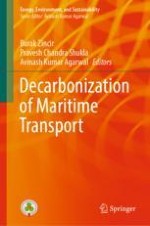2023 | OriginalPaper | Chapter
5. Investigation and Examination of LNG, Methanol, and Ammonia Usage on Marine Vessels
Authors : Çağlar Karatuğ, Bulut Ozan Ceylan, Emir Ejder, Yasin Arslanoğlu
Published in: Decarbonization of Maritime Transport
Publisher: Springer Nature Singapore
Activate our intelligent search to find suitable subject content or patents.
Select sections of text to find matching patents with Artificial Intelligence. powered by
Select sections of text to find additional relevant content using AI-assisted search. powered by
